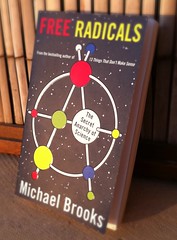Michael Brooks has scratched beneath the glossy surface of science to write a revealing and thoroughly entertaining book about its practitioners. By cutting so close to the scientific bone that it spills blood, his “Free Radicals” departs violently from the textbook image of white-coated professionalism.
In eight gritty and gripping chapters Brooks uncovers the anarchy at the heart of many of the most famous advances made by scientists. Not content with bending rules to breaking point, they are happy to do the same with the truth if it will advance their glorious hypothesis, and with it, their career. They lie and they cheat, they slander their rivals and puff up their own importance, they gang up on outsiders, they take drugs to fire the imagination. Dear me, how have they been getting away with it for so long?
Not every scientist, of course, as Brooks is careful to point out, but the roll-call of the accused is impressively long and studded with celebrated names: Einstein, Galileo and Newton, among many others, are called to account. The author has dug up a treasure trove of stories from all branches science to illustrate the anarchy at its core. As well as the usual suspects, there is a good smattering of names that were new to this reader: Alfvén, Ovshinsky or Margulis, for example, or the improbably named Landrum Shettles, an early pioneer of in vitro fertilisation.
But having cut to the core, Brooks has no intention of pronouncing it rotten. Human it may be — and disastrously erroneous at times — but the message here is that science remains our most powerful way of knowing the world. It’s just that the process is more messy, viscerally so, than is often pretended, even by scientists themselves.
The recurrent theme of anarchy and anarchists is a clever trope, though at times it strains under the weight of the thesis placed upon it. In part this is because most of the examples given are of the celebrated elite — the famous names and Nobel laureates — who are of course only a minority of scientists. All is not anarchy, or infamy, in every laboratory of the world.
Nevertheless, there is plenty of substance here to stimulate the reader. I was struck by the parallel with Kuhn’s notion of scientists clinging possessively, often against the odds and by means fair or foul, to their ideas as an essential part of the process of science. It comes naturally since, to a significant extent, our ideas define us. Most scientists, myself included, will have felt the stab of pain when a cherished theory — it doesn’t have to be an especially momentous one — is felled by a belligerent fact. It’s bad enough if the troublesome data emerges from our own experiments, worse still if it is unearthed by a rival.
This may be an all too human frailty, but it is one that seems to be unavoidable for the process of science: only through the battling of champions can the better ideas win through. What Brooks’ “Free Radicals” illustrates with rich and sympathetic colour is that the fight can be surprisingly bloody and may not even be won on the first round. In some cases, the thwarted protagonist may never taste the sweetness of victory: Subrahmanyan Chandrasekar’s abysmal treatment at the hands of Eddington and the rest of the British astronomical establishment is perhaps the most painful story in the book.
All of which is not to excuse bad or unethical behaviour in the name of science but only to recognise the humanity of the business. Brooks has done a wonderful job of pointing to scientists’ feet of clay. At times, perhaps, his enthusiasm gets the better of him. He tries a bit too hard, I felt, to convince himself that Crick may have used LSD. Elsewhere I wanted to know more: if Einstein had failed repeatedly to prove his most famous equation linking energy and mass, what exactly had he missed, and what did his contemporaries think of the error? But those inevitable questions are perhaps the stuff of another book.
“Free Radicals” should be read by anyone seeking to think clearly about what science is really like. And it’s not just for public consumption. Brooks is also keen to call scientists to their wider responsibilities — to take science to the people and to politicians. He chides them, justifiably in many cases, for hiding behind the veil of professionalism to avoid any taint of politicking; the account of the relatively slow response to the ozone hole, due in part to hesitation by the scientists involved even though their data were solid, is a telling example of over-caution. But society needs more than technical expertise delivered from a laboratory bunker. It needs scientists to come out to play. But guys: play nice.






This is great, Stephen. I’ve been working right along these lines. Will have to read the book.